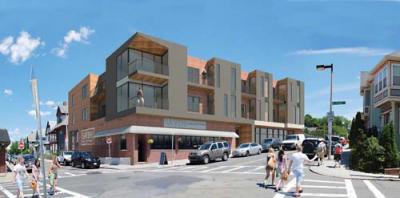October 8, 2014
 Savin Hill Ave. project: Architect’s rendering showed proposed condos over Savin Bar + Kitchen. Drawing courtesy RODE Architects.
Savin Hill Ave. project: Architect’s rendering showed proposed condos over Savin Bar + Kitchen. Drawing courtesy RODE Architects.
The future of a vacant lot across from Savin Hill T station, previously the site of a proposed 14-unit residential and commercial development, hangs in the balance after the project’s private developer, David Higgins, said late Tuesday evening that he was walking away from the development.
In an interview with the Reporter, Higgins, who has co-owned the property at 120 Savin Hill Avenue since 2006, said, “I’ve worked hard for the last two years and invested a lot of time and money. I’ve tried. Maybe it’s time for someone else.” When asked, he said the community’s issues with parking played a role in his decision.
“My hope is that David comes back with the original plan,” said Eileen Boyle, president of the Columbia-Savin Hill Civic Association on Wednesday morning. “The CSHCA will have to wait and see.”
Higgins decided to cut his losses after concerns over parking availability at the site came to a head earlier this week. On Tuesday, the day after members of the CSHCA had reversed field from a positive decision in May and voted against supporting the proposal because it did not guarantee 15 parking spaces, the developers put off their scheduled hearing in front of the city’s Zoning Board of Appeals.
Long an eyesore in the neighborhood, the vacant lot between Savin Hill Bar and Kitchen and the MBTA ‘s property is co-owned by Higgins, who has partnered with Savin Hill Bar and Kitchen co-owners Driscoll DoCanto and Ken Osherow to develop a transit-oriented three-story building that would include first-floor retail space and second and third floors of residential condos that would be cantilevered over Savin Hill Bar and Kitchen. Osherow also owns the popular breakfast spot McKenna’s, the Savin Hill Scoop ice cream shop, and At Home Realty, all located in the same area on Savin Hill Avenue.
Now, the next steps for the project are unclear. DoCanto had no comment for the Reporter on Wednesday.
At Monday’s discussion at the Little House on East Cottage Street, which became heated at times, Higgins told the civic association that he would walk away from the project if the association did not vote to support it despite his not delivering on parking. Seemingly hoping to call his bluff, the association still voted no.
On Tuesday, Higgins told the Reporter that he had to take time to see if the project was still financially viable, saying that it was possible he could quit the project with which he has been involved since 2006. Adding on-site parking to the development could be prohibitively expensive, he said, and it was not clear if the return on investment was enough to continue with the project. “If it’s not financially viable, I don’t have a choice but to walk away.”
It is not clear what DoCanto and Osherow will do now ahead of the deferred ZBA hearing on Nov. 25. While the city could approve the project without the civic group’s support, that is an unlikely prospect.
When the association voted in the spring to support the project, its approval was contingent on the project’s parking proposal: 15 parking spaces for the 14 mixed-use residential and retail units. At the May meeting, developers said that the parking, provided off site, was likely, but at this week’s meeting, billed as an “update” on the project, Docanto and Higgins said the 15 spaces were not available. Instead, they would offer five on-site parking spots.
In a letter to the ZBA ahead of Tuesday’s scheduled hearing, the association wrote that their “no” vote would allow more time for the community to review the amended parking plan. Many in attendance on Monday night were unhappy with the reduction to five spaces, maintaining that parking issues in the neighborhood would only be exacerbated by the development despite its close proximity to the T stop.
“Many of us have family and friends in South Boston and they have advised us to be extremely careful with the size of development without parking,” Savin Hill Civic Association President Eileen Boyle told the Reporter on Tuesday.
However, others at the meeting took no issue with parking, saying that the development’s proximity to the T Station meant there was no need to provide a parking space for every unit.
For her part, Boyle said on Tuesday that no matter what development goes into the location right across from the train station, parking must be provided.
Villages:
Topics:


